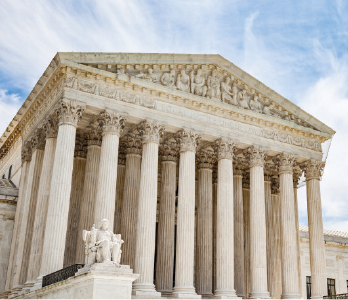
The U.S. Supreme Court
As America’s capital, Washington, D.C., maintains an outsized influence in our daily lives. Despite having a meager sliver of the New York City population, the daily political transactions that transpire in the District of Columbia impact our lives. The comings and goings in the corridors of Congress are likely to have a greater impact on us than most of the decisions rendered by the business tycoons deliberating in the boardrooms perched high above the clouds gracing the Manhattan skyline.
The District is replete with political power brokers, some best characterized by the fictional couple, Frank and Claire Underwood, magnificently portrayed by the actors Kevin Spacey and Robin Wright in the political drama, House of Cards. The binge watching that made this fictional series such a hit runs counter to the adage that, “laws are like sausages, it is better not to see them being made.”1 Humans have an innate fascination with political intrigue and drama.
Politicians are not the only residents of the District of Columbia whose decisions impact our daily lives. Legions of anonymous congressional staffers, charged with the task of ghostwriting the bills that become law, spend countless hours and sometimes days or weeks struggling with single word or phrase insertions or deletions that can have deeply resonating effects on society. Consider the recent Supreme Court decision affirming the legality of the Affordable Care Act (ACA; aka Obamacare) that hinged on the interpretation of just four words, “established by the state,” that were buried in a 900-page law.2
Then there is the array of mid- to senior-level bureaucrats who oversee the various departments that make up the federal government and whose role it is to implement the will of Congress. Similar to the concept of translating scientific discovery from bench to bedside, these are the people, for example at the Department of Health and Human Services, the Food and Drug Administration and elsewhere, who craft wordy legislation into policy that can profoundly shape our practice of medicine.
What sets the United States apart from many democracies, including those with a strong tradition of maintaining a robust set of freedoms and individual privileges, is the ability of its citizenry to successfully challenge any law in court. The constitutional concept behind the separation of powers is a brilliant one, meant to counter the potential for the abuse of authority by the legislative, executive or judicial branches of government. Even though it has spawned the explosive growth of the legal profession—now exceeding 1.2 million lawyers—and fostered a proclivity for some frivolous lawsuits, our society would suffer without having the courts overseeing the other branches of government.3
The Supremes
Of all the courts in the land, there stands one that sits far above the others, one whose every verdict is thoroughly parsed and meticulously analyzed in Talmudic fashion, for its nine justices are vested with the authority to issue the final word on legal disputes. Say hello to SCOTUS, the Supreme Court of the United States.

